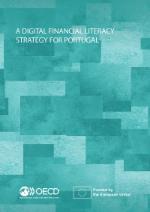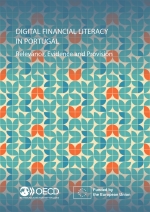Financial education and consumer protection
Digital Financial Literacy in Portugal
About the project
This work is the result of the cooperation between the OECD and the Banco de Portugal, which requested support from the European Commission under the Technical Support Instrument (TSI) Programme. The OECD is the implementing partner of the project. This project is carried out with funding by the European Union via the Technical Support Instrument and in cooperation with the European Commission Directorate General for Structural Reform Support (DG REFORM).
|
Date of publication |
A Digital Financial Literacy Strategy for PortugalDownload the full reportPortuguese version available hereMore info about the event here
10 May 2023 - The Digital Financial Literacy Strategy for Portugal sets out a long-term vision and objectives, supported by short- and medium-term actions, for Banco de Portugal and other Portuguese stakeholders with an interest in improving digital financial education.
The Strategy aims to empower the Portuguese population to safely use digital financial services and to contribute to reducing digital financial exclusion. Overall, the Strategy is intended to support people living in Portugal to improve their financial well-being and resilience. It was developed through a consultative and evidence-based approach, in line with the OECD Recommendation on Financial Literacy.
The Strategy was presented during a launch event in Lisbon on 10 May 2023 with remarks from Mário Centeno, (Governor, Banco de Portugal), Francisca Guedes de Oliveira (Member of the Board of Directors, Banco de Portugal), Elisa Ferreira (Commissioner for Cohesion and Reforms, European Commission) and Fabrizia Lapecorella (Deputy Secretary General, OECD).
|
|
Date of publication |
Digital Financial Literacy in Portugal: Relevance, Evidence and ProvisionDownload the full report
05 April 2023 – Financial digitalisation - further accelerated by the COVID-19 pandemic - has given greater opportunities to individuals to access financial products and services and plan their financial future. At the same time, digital financial services have introduced new challenges and risk factors such as a greater exposure to online fraud and scams, issues related to personal data protection, and potentially greater exposure to behaviour biases in financial decision-making. Moreover, digitalisation can bring about new challenges and forms of exclusion for groups with limited digital access and skills. These trends have emerged in many countries around the world, including Portugal.
Digital financial literacy is important to empower people to safely use digital financial products and services, and to make them more resilient in their online financial transactions. Ultimately, digital financial literacy is expected to improve individual financial resilience and well-being, while contributing to the inclusive and sustainable development of the economy and society.
Portuguese authorities acknowledged the need to further develop digital financial literacy in Portugal, by collecting further evidence about digital financial literacy levels and about digital financial education provision in the country. This report maps the existing provision of digital financial education in Portugal and presents the results of a quantitative survey assessing individual levels of digital financial literacy. It builds on these findings to identify specific digital financial literacy needs of the population as well as gaps in the existing provision of digital financial education. This report will support the development of an evidence-based digital financial literacy strategy for Portugal, including an implementation roadmap.
|
Funded by the European Union via the Technical Support Instrument, and implemented by the OECD, in cooperation with the European Commission.

Contact us at SecretariatINFE@oecd.org
Related Documents

